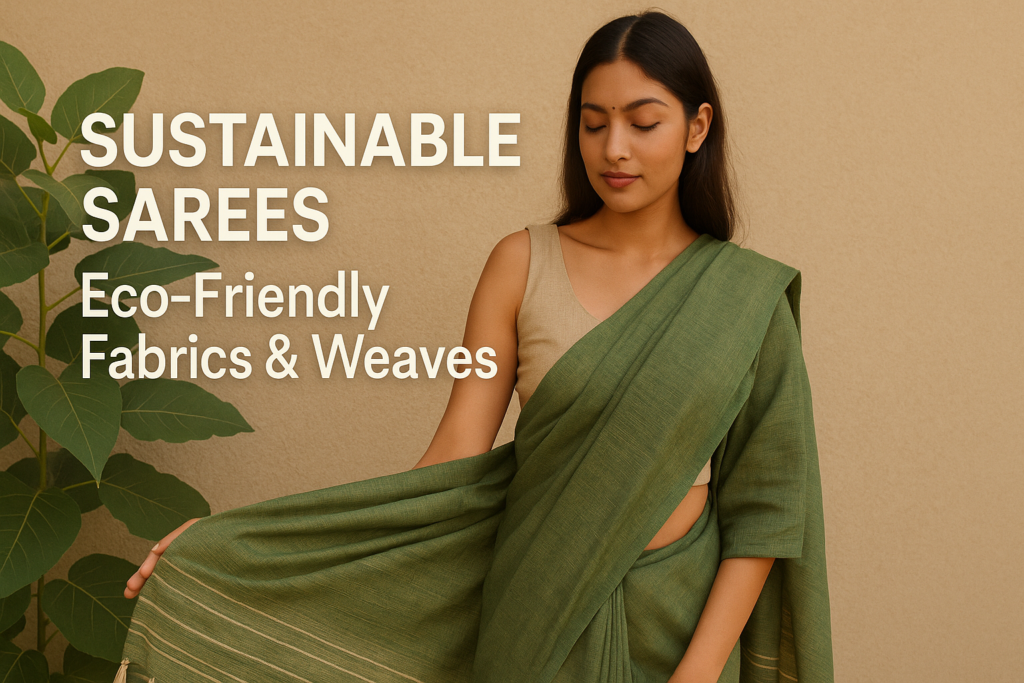
The Rise of Conscious Fashion in Indian Ethnic Wear
In an era where fashion meets responsibility, the traditional Indian saree is embracing a green revolution. Sustainable sarees are gaining momentum as fashion-forward individuals turn to eco-friendly choices that align with environmental and ethical values. With a growing emphasis on slow fashion, the spotlight is now on organic sarees and eco-friendly saree brands that blend timeless elegance with mindful living.
What Are Sustainable Sarees?
Sustainable sarees are crafted using natural fibers, ethical weaving practices, and environmentally friendly dyes. These sarees are designed to minimize harm to the planet while promoting artisanal craftsmanship. Whether made from organic cotton, peace silk, banana fiber, or bamboo fabric, these sarees reflect a deep commitment to sustainability and fair trade.
Why Choose Organic Sarees?
Organic sarees are made from fibers grown without harmful pesticides or synthetic fertilizers. This not only protects the environment but also ensures the health and safety of the farmers and artisans. Here’s why they are worth embracing:
- Chemical-Free: Safe for your skin and the planet.
- Biodegradable: Minimizes textile waste.
- Soft & Breathable: Ideal for daily wear and festive occasions.
- Supports Local Weavers: Promotes indigenous craft and rural employment.
Top Eco-Friendly Saree Brands in India
India is witnessing a surge in eco-conscious saree labels that are redefining traditional fashion. Here are some notable eco-friendly saree brands you should explore:
- Fabindia – Known for its handwoven organic cotton and khadi sarees.
- Ethicus – A pioneer in farm-to-fashion organic sarees.
- Okhai – Offers sustainable weaves and promotes rural women artisans.
- Suta – Fuses tradition with comfort using natural fabrics and low-impact dyes.
- Upasana – Integrates sustainability into every thread with organic dyes and ethical production.
Trending Fabrics in Sustainable Sarees
The shift to green textiles has introduced a range of innovative and traditional eco-fabrics. Some trending ones include:
- Peace (Ahimsa) Silk: Harvested without harming silkworms.
- Hemp and Bamboo Blends: Naturally antimicrobial and durable.
- Kala Cotton: A hardy, rain-fed cotton native to Gujarat.
- Recycled Fabric Sarees: Created from post-consumer textile waste for a zero-waste approach.
How to Identify an Eco-Friendly Saree
Before buying, check for:
- Organic certification (like GOTS).
- Labels indicating natural dyes and handloom weaving.
- Transparency about sourcing and production.
- Minimal or recycled packaging.
Sustainable Styling Tips
Sustainable fashion doesn’t mean compromising on style. You can:
- Pair organic sarees with upcycled or hand-embroidered blouses.
- Reuse old sarees creatively – convert them into lehengas or dupattas.
- Accessorize with handmade, locally sourced jewelry.
Conclusion: Weaving a Greener Future
The demand for sustainable sarees is not just a trend—it’s a movement toward a cleaner, kinder fashion future. By choosing eco-friendly saree brands and supporting organic sarees, you are not just embracing elegance but also empowering artisans and protecting the planet. Let your saree be more than just a fashion statement—let it be a symbol of conscious living.
